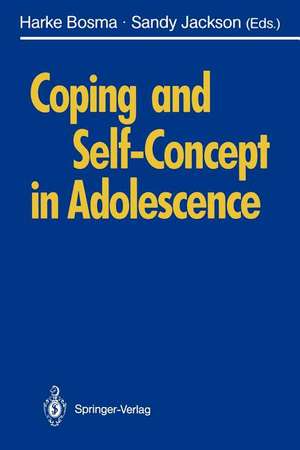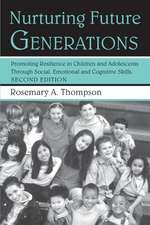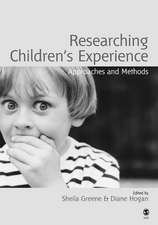Coping and Self-Concept in Adolescence
Editat de H. A. Bosma, A. E. (Sandy) Jacksonen Limba Engleză Paperback – 12 dec 2011
Preț: 640.06 lei
Preț vechi: 753.01 lei
-15% Nou
Puncte Express: 960
Preț estimativ în valută:
122.47€ • 133.45$ • 103.20£
122.47€ • 133.45$ • 103.20£
Carte tipărită la comandă
Livrare economică 24 aprilie-08 mai
Preluare comenzi: 021 569.72.76
Specificații
ISBN-13: 9783642752247
ISBN-10: 3642752241
Pagini: 288
Ilustrații: XI, 270 p.
Dimensiuni: 155 x 235 x 15 mm
Greutate: 0.41 kg
Ediția:Softcover reprint of the original 1st ed. 1990
Editura: Springer Berlin, Heidelberg
Colecția Springer
Locul publicării:Berlin, Heidelberg, Germany
ISBN-10: 3642752241
Pagini: 288
Ilustrații: XI, 270 p.
Dimensiuni: 155 x 235 x 15 mm
Greutate: 0.41 kg
Ediția:Softcover reprint of the original 1st ed. 1990
Editura: Springer Berlin, Heidelberg
Colecția Springer
Locul publicării:Berlin, Heidelberg, Germany
Public țintă
ResearchDescriere
Self-concept and coping behaviour are important aspects of development in adolescence. Despite their developmental significance, however, the two areas have rarely been considered in relation to each other. This book is the first in which the two areas are brought together; it suggests that this interaction can open the way to new possibilities for further research and to new implications for applied work with adolescents. Two separate chapters review research carried out in each of the areas. These are followed by a series of more empirically focussed chapters in which issues such as changes in relationship patterns, difficult school situations, leaving school, use of leisure, anxiety and suicidal behaviour are examined in the context of self-concept and coping. The final chapter seeks to identify some of the central themes emerging from this work and discusses possible research and applied implications.
Cuprins
1 Coping and Self in Adolescence.- Coping and Developmental Tasks.- Self-Concept and Identity.- Coping and Identity.- Plan of the Book.- 2 The Problem of Self-Conceiving.- Self-Concept, Self-Conception, and Self-Conception Problems.- Self-Conception Problems in Adolescence: The Contribution of Erikson.- Some Controversies and Alternatives.- Conclusion.- 3 Coping and Development.- Adolescence — A Period of Disturbance or of Active Coping?.- Coping in Adolescence: Concepts and Theory.- Personality and Development in a Coping-Theoretical Perspective.- Normally Developing and Troubled Adolescents.- Concluding Remarks.- 4 Developmental Processes in Self-Concept and Coping Behaviour.- Dimensional Structure of Self-Concept and Coping; Age and Sex Differences.- Stability and Continuity of Self-Concept and Coping.- Relationship Between Self-Concept and Coping.- Clinical Significance of Self-Concept and Coping Style.- Cross-Cultural Differences in Self-Concept and Coping Style.- Conclusions.- 5 Selves-in-Relation: School Leavers’ Accommodation to Different Interpersonal and Situational Demands.- Selves-in-Relation.- Early School Leavers in the United Kingdom.- Young School Leaver’s Accommodation to Post-school Life.- Results.- Discussion.- 6 Ego-Strength Development and Pattern of Social Relationships.- Design of the Constance Longitudinal Study.- Developmental Patterns in Adolescence.- Definition of Intra-Individual Change in Ego-Strength.- Ego-Strength Development and the Pattern of Social Relationships in Adolescence.- Conclusions.- 7 Adolescents’ Orientations for Development.- Present-State and Future-Time Perspective: Age Trends and Sociodemographic Variation.- A Typology of Patterns of Change in Present-State and Future-Time Perspectives.- Transition into Occupational Preparation in Relation to Self-Esteem.- Transition into Intimate Partnership in Relation to Self-Esteem, Friendship Conceptions and Leisure-Time Activities.- Conclusion and Prospects.- 8 Self Through Relationship Development.- Relationship Development: Methods of Investigation.- The Self in Relationships.- The Self in Parent-Child Relationships.- The Self in Children’s Friendships.- The Self in Adolescent Friendships.- The Self in Adolescent-Parent Relations.- Conclusions.- 9 Continuity and Commitment: A Developmental Analysis of the Identity Formation Process in Suicidal and Non-suicidal Youth.- One: On Being Counted Only Once — The Problem of Numerical Identity.- Why Being or Having a Self Requires a Conviction of Personal Continuity.- Two:A Typology of Possible Continuity Warrants.- Relations of Structural Similarity.- Functional Relations of Equivalence.- Numerical Identity and Development.- Three: An Empirical Account of the Continuity-Warranting Practices of Suicidal and Non-suicidal Adolescents.- Summary and Conclusions.- 10 Anxiety in Adolescence: Sources and Reactions.- Method.- Results.- The Universe of Adolescents’ Fears.- Reactions to Anxiety-Provoking Situations.- Relations Between Fear Situations and Reactions.- Conclusion.- 11 Coping with Difficult School Situations and Stress Resistance.- Adolescents’ Response to Difficult Situations.- Results.- Individual Characteristics of Adolescents and the Difficult Situations They Experience at School.- Discussion.- 12 Coping and Self-Concept: Retrospect and Prospect.- Retrospect.- Prospect.- A Changed View of Adolesence.- Coping Rather than Crisis.- Coping and Self-Concept.- Further Research Issues.- Research Methods.- Optimalising Adolescent Development.- Intervention.- Conclusion.- References.- Author Index.














